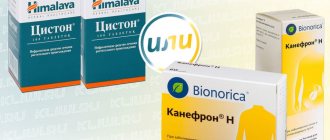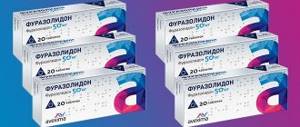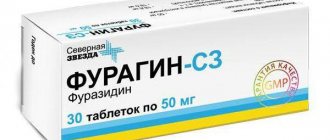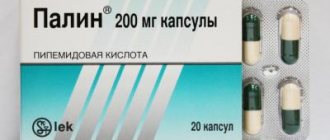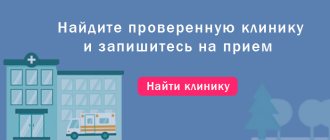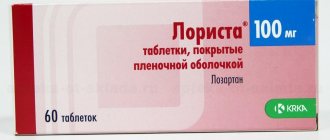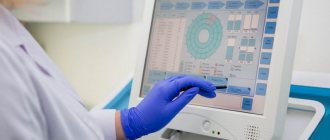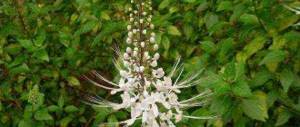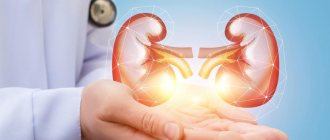Inflammatory changes in the mucous membrane of the bladder make life unbearable for patients with cystitis.
Constant urge to go to the toilet, pain and pain when urinating are a constant concern. The right decision for cystitis is not to self-medicate, but to consult a doctor who will prescribe an effective medication.
For cystitis, most doctors are inclined to prescribe Cyston, an anti-inflammatory and antibacterial agent that can relieve the symptoms of cystitis.
Composition and release form
Cystone is produced only in tablet form. Packaged in jars of 100 pieces.
Active substances are extracts of various herbs. All of them are known for their ability to destroy kidney stones and remove salt concentrations from the body. Some hoods are treated with steam. This processing allows you to take the maximum useful elements from each plant. All their natural strength goes to fight pathogenic bacteria.
One tablet contains at least 65 mg of flowers of the double-stemmed plant, known for its medicinal properties. It has been used since ancient times in Arab and Persian medicine.
49 mg of saxifrage reed stems, which has strong healing abilities, has anti-fever and anti-tumor properties.
The underground part of the satiety is membranous, which has diaphoretic and analgesic properties.
The stems of madder cordifolia have always been widely used in folk medicine.
The seeds of the strawflower are not only beneficial in themselves, but help activate the strengths of other plants.
Onosma bracts has a strong diuretic property.
Vernonia ashy is also quite popular among traditional healers. It is included in preparations for diabetics, anti-fever medications, and is used in the pharmaceutical industry to create medications for some symptoms of AIDS.
In addition, Cyston contains the leaves, flowers and stem of fragrant basil, which is loved not only by chefs for its taste, but also by pharmacists for its equally outstanding chemical composition. Horsetail also has the same properties.
Fava bean and teak seeds are also widely known for their anti-inflammatory properties and diuretic properties.
The fruits of Tribulus terrestris are used to alleviate not only all types of nervous diseases, but also to treat urolithiasis.
Mimosa pudica seeds and fragrant pavonia were also included in the composition for the same properties.
In addition to herbs, the composition also contains 13 mg of purified and crushed mumiyo, an organo-mineral alternative medicine product of natural origin, and 16 mg of lime silicate.
Magnesium stearate, crospovidone, aerosil, sodium carboxymethylcellulose, microcrystalline cellulose are also present as auxiliary ingredients.
Properties
It has a nephrolitholytic effect. Dissolves large concretions (stones) in the kidneys, and removes small ones. It does not allow the bonds between substances that serve as building materials for stones to strengthen. As a result, the particles disintegrate, the stones decrease in size and disintegrate altogether.
The essence of this effect is that the drug removes all foreign formations from the kidneys, preventing the formation of new stones. This provides not only a therapeutic effect, but also the prevention of urolithiasis.
Thanks to its antispasmodic effect, it reduces the tone of the muscles of the bladder and urinary tract. As a result, pain from the movement of stones goes away, itching and burning when visiting the toilet disappear.
Due to its antimicrobial and antiseptic properties, it suppresses pathogenic bacteria and provoking microorganisms. Reducing the risk of inflammatory and infectious processes in the urinary system.
Cystone is able to reduce the manifestations of inflammatory processes occurring not only in the tissues of the kidneys, but also on the mucous membrane of the urinary tract. Reducing the risk of such occurrence to a minimum.
The pronounced diuretic property allows for the timely release of urine from the kidneys, thereby preventing the formation of stagnation. Thanks to this, the salt in the body does not have time to precipitate, forming crystals that accumulate into stones.
Cyston owes these properties to its ability to eliminate phosphate and oxalate salts, small stones and uric acid from the kidneys. By stabilizing the level between the crystals and the colloidal matrix, it prevents the appearance of minor damage to the mucosa.
Reduces the content of oxalic acid and calcium hydroxyproline, which provoke the formation of kidney stones. Increases the content of sodium, potassium, magnesium in the urine, which inhibits the process of formation of new formations.
The top layer of stones becomes looser, more pliable, and the process of their destruction is easier. Prevents salt crystals and other particles from collecting around the core, which significantly inhibits stone growth. Among other things, it allows the bladder muscles to relax and relieves pain.
An important point is that Cyston does not affect the pH of urine in any way, without increasing acidity or alkalizing.
Operating principle
The drug has a complex therapeutic effect, which consists of effects such as:
- Diuretic;
- Litholytic;
- Anti-inflammatory;
- Antispasmodic;
- Antimicrobial, etc.
Thanks to the diuretic effect, patients get rid of urinary stasis, urinary processes are activated, and urine is removed in a timely manner. As a result, the salts do not have time to settle in crystalline form and come out naturally.
A similar effect prevents stone formation:
- If there are already stones in the renal parenchyma, then taking the drug will help dissolve them and remove them in the form of sand.
- The components of the drug affect the stone formation processes in such a way that the physico-chemical bonds in them are interrupted, and accordingly, the stone formation process stops.
- The anti-inflammatory effect reduces or suppresses inflammation in the urinary and renal structures.
- Taking the drug relaxes the urinary and urinary structures, which helps eliminate problems with urination. The antispasmodic effect of the tablets relieves pain caused by stone advancement. Eliminates the drug and burning-cutting symptoms.
- Taking Cyston helps destroy microorganisms and bacteria that provoke the development of inflammatory lesions.
In general, we can say that the therapeutic qualities of Cyston are akin to drugs of synthetic origin, only there are no such large-scale side effects from it.
The principle of action of the drug Cyston
Indications for use
As an independent remedy, Cyston is ineffective, but when taken in parallel with other drugs, it vigorously works for a positive result.
Most often used in the fight against urolithiasis. Thanks to its homeopathic properties, it works gently and safely for the body, having a positive effect on the dynamics of the disease.
It also works well as a preventative, for which it is included in the course of postoperative courses.
Treats salt diathesis (crystalluria), preventing salt particles from causing damage when passing through the ureters. Infections of the urinary system, including in pregnant women.
How does it interact with other drugs?
When taking Cyston, it is important to follow not only the instructions for use, but also consider how to combine it with other medications for cystitis. So, if antibiotics are prescribed as the main therapy, the active substances of the herbal medicine can increase the antibacterial effect. It can be combined with drugs such as Monural, Palin, Nolitsin.
In clinical studies, it was found that the drug slows down the absorption of sulfamethoxazole and accelerates the absorption of trimethoprim.
When prescribing the drug as an additional therapy, it is necessary to adjust the doses of other drugs.
Cyston - instructions for use
Take on a full stomach, so the best time is after a meal. No need to chew. Please note that Cyston has a diuretic effect, which means a lot of water is removed from the body. In order for everything to work properly, without failures, you should drink up to 2.5 liters per day. Liquid food and drinks are not included in this volume.
Pain may appear during treatment; in this case, we stop the procedure immediately. Since therapy can provoke the movement of large stones and block the ureters.
Do not forget that the tablets consist entirely of herbs, which means the results of the procedures appear gradually. The best effect of treatment occurs no earlier than after a couple of weeks. Its effect can continue for another 15-30 days after the end of administration.
The dosage is individual, it depends on the diagnosis and severity of the disease. It should be remembered that Cystine does not work very effectively on its own. But in combination with others it shows good results.
So gout requires several courses of treatment. Each of which lasts 30-60 days. Between each course a break equal to the course itself is required. That is, if the drug was taken for 45 days, then you should take a break for the same 45 days. After a break, repeat the procedure.
Dosage
For patients over 14 years of age, the dosage is calculated according to the following scheme:
- For kidney stones: 2-3 tablets two to three times a day until the stone passes, or for 4-6 months.
- In order to prevent relapse of stone formation, 2 tablets per day are prescribed in the first 30 days. From the second to the fifth month you need to halve the dose and take the medicine twice a day.
- To neutralize infection in the ureters and bladder, the course of therapy will be 6-12 weeks. During this period, you need to drink 2 tablets two to three times a day.
- For renal colic, take 1 tablet of the drug per day until pain symptoms disappear.
The exact dosage of the drug and the duration of the course should be prescribed by the doctor, focusing on test data and the characteristics of the patient’s body.
Dosage regimen for children aged 2 to 14 years:
- For urinary tract infections, patients aged 2 to 6 years are given half a tablet three times a day. Duration of therapy is 4-6 weeks. For patients aged 6 to 14 years, the dose can be doubled.
- For urolithiasis, children from 2 to 6 years old are given half a tablet three times a day until the stone passes or for 4-6 months. For children aged 6-14 years, the dose should be doubled.
- In order to prevent the recurrence of kidney stones, children from 2 to 6 years old take a quarter of a tablet, patients over 6 years of age take half a tablet.
- For renal colic, children 2-6 years old are prescribed half a tablet three times a day until the pain disappears; patients over 6 and under 14 years old are given a whole tablet.
Analogs
Cyston has no direct analogues. Simply put, in all of world pharmacology there is no other drug with the same composition. But the pharmaceutical market can offer quite a lot of drugs similar in their therapeutic properties to Cyston. Its price in pharmacies is quite affordable, about 350 rubles.
Afala. Relieves swelling, stabilizes blood flow in the prostate.
Bangshil. Known as bactericidal and bacteriostatic, it normalizes urination. Available in tablets.
Canephron N. It treats well not only acute, but also chronic forms of infectious diseases of the urinary system. It is used both in tablets and as a solution.
Nephrophyte with orthosiphon. (herbal tea “Altai” No. 22) Used for prevention and complex treatment of urolithiasis. Indispensable for relieving swelling. Produced in the form of a herbal tea intended for steaming.
Pipemidine. Relevant for acute and chronic urinary tract infections. Taken in the form of pills.
Spilled Capsules containing herbal ingredients and designed to combat urolithiasis.
Renel. Antispasmodic and diuretic agent with analgesic and anti-inflammatory properties. The tablets are placed under the tongue until completely dissolved.
Rowatinex. Promotes the destruction and removal of stones. In capsule form.
Solidago compositum S. Relieves inflammation and pain, has diuretic, antispasmodic, hypotensive, antimicrobial, sedative and anticonvulsant activity. It is used in the form of injections.
Trinephron. It has a pronounced anti-inflammatory effect and also eliminates spasm of the smooth muscle layer of the urinary tract. Has a herbal composition. Oral solution.
Uro Veda. Diseases of the urinary system, consists of herbs. In the form of tablets.
Uro-control. Relieves inflammation, is an antibacterial, diuretic, antioxidant, and helps improve immunity. Pills.
Urolesan. Antispasmodic, anti-inflammatory, antiseptic, acidifies urine, increases the secretion of urea and chlorides. Oral solution.
Uronephron. A combined drug with diuretic, antimicrobial, antispasmodic and anti-inflammatory effects. Entirely and completely plant-based. Syrup for oral administration.
Urocholum. A complex medicinal product containing active components of plant origin. Also available in syrup form.
Flavia. Against frequent urges, pain and inflammation. Capsules.
These drugs do not include a list of analogues. The price range is quite wide, from one hundred rubles to one and a half thousand.
What can Cyston be replaced with?
Cyston or Canephron, which is better? Both are herbal preparations; their compositions contain exclusively extracts and extracts of valuable plant specimens growing all over the world.
The first is produced exclusively in India, its competitor is in Germany. This is perhaps the single most noticeable difference. As for the purposes of use, there are more and more points of contact. Both are used only in combination with other drugs. They work well against inflammation in the urinary system, promote the destruction of kidney stones, and prevent their formation in the future.
Their area of action is approximately the same, so they are often prescribed for the same symptoms.
But, despite such a similar effect of both, there are differences between Canephron and Cyston. The second contains a much larger list of components, which means that when taking it, a person has a greater chance of getting an allergic effect. With Canephron it’s easier in this regard. During the entire period, not a single allergic reaction was noted.
Contraindications
- According to the description of the drug, the only contraindication for the use of Cyston is hypersensitivity to one of the components of the tablets .
- In addition, the medicine is not recommended for children under 18 years of age.
- Cyston is not prescribed for stones larger than 9 mm or severe pain in the renal area of unknown etiology.
Before you start taking pills, you should make sure there are no contraindications.
special instructions
Cyston can be used during pregnancy, as they contain exclusively plant components, which do not harm either the mother or the child.
Cyston has a very difficult relationship with alcohol.
The main task of the active substances of the drug is to remove stones from the body. Alcohol makes this work more difficult, as it puts additional stress on the body, forcing the kidneys to work faster. As a result, dehydration and blood thickening may occur. The result is kidney destruction.
Reviews
Oksana: I have had pyelonephritis since my youth. It all started when I was rushed to the hospital in an ambulance with terrible pain in my lower abdomen. When I was discharged, the doctor warned that now I would have to carefully monitor not to get cold, since pyelonephritis is such a sore that almost always comes back. And he looked straight into water. About a year and a half ago, my therapist prescribed Cyston for me. I took it as a course and drank it for a long time, probably for five months. Now I take it for prevention and have practically forgotten about pyelonephritis.
Sergei Vladimirovich: One day it turned out that I had kidney stones. The doctor suggested surgery and explained that several stones were quite large, such drugs could be dissolved, but the treatment would be long and difficult. We decided to do without surgery, I have a weak heart, and anesthesia is a risky undertaking for me. They prescribed me a whole bunch of things. But I took most of the medications for no longer than a month, but I took Cyston for a very long time. As a result, all the small stones came out, the large ones shrank several times.
Sasha: Prostatitis has clung to me, not a moment of peace. Needless to say, it’s an unpleasant sore. The doctor gave out a whole list for the pharmacy. Tsiston was also there. At first I didn’t even want to buy it when I found out that it only contains herbs. But they explained to me that most urological diseases are treated with natural drugs. After just a month of treatment, the doctor noted positive dynamics. Now I won’t be so skeptical about herbal pills.

